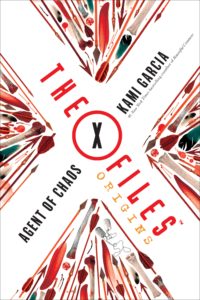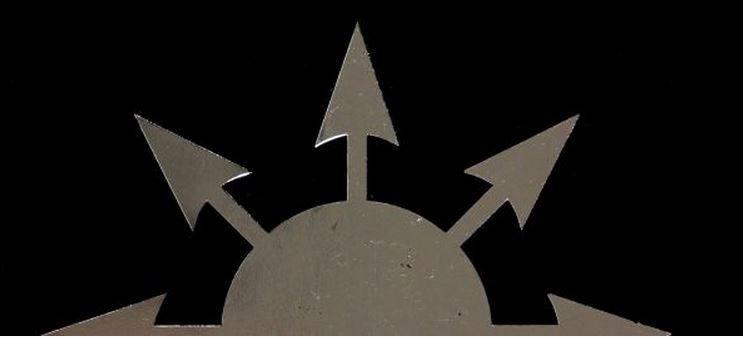It’s the summer of 1979. Fox Mulder is seventeen and living with his father in Washington, DC. His dad has a secretive role with the government and takes little interest in his son’s life, other than an obsessive desire for him to attend Georgetown University. Mulder doesn’t intend on being forced into anything. Just like his adult-self, he’s the one who will determine his path–using only his passion and intellect to guide him.
When children go missing, and one of them turns up dead, the restless demons from Mulder’s past awaken with renewed intensity. Five and a half years ago he wasn’t able to prevent his sister Samantha from being abducted, even though he was in the room with her when she was taken. The twin engines of guilt and hope drive him to discover who’s taking these children and why. Mulder wants to believe his pursuit of DC’s serial killer, or killers, will help him find his sister or at least discover what happened to her. No matter what, he knows he has to save the other children even though he wasn’t able to save Samantha.
Agent of Chaos is a thrilling trip through light, darkness, belief, doubt, terror, and hope. At every turn, questions shoot out like screams from a rollercoaster ride and Kami Garcia masterfully wields her writer’s wand to determine what’s unveiled and what’s kept hidden. This #1 New York Times best-selling author created the teenage history of The X-Files Agent Fox Mulder with intellect, earnestness, and enthusiasm. Garcia’s a gifted storyteller, and this well-crafted, high-tension novel will delight X-Files fans and newbies alike!
Please enjoy BCB’s discussion with this very talented author. Thanks for joining us, Kami! 
Amy M. Hawes: Agent of Chaos isn’t the first story you’ve written about the young Fox Mulder. You created a short story that told about his experience as a sixteen-year-old. Is there anything in Black Hole Son readers of Chaos should know? And, how did writing the short story help you with the novel?
KG: Actually, Black Hole Son led directly to Agent of Chaos. Jonathan Maberry, who wrote Devil’s Advocate, Scully’s origin story, was editing three anthologies of original X-Files short stories. He asked me if I would write one. I told him I didn’t have time to do a nine-season re-watch because I was on a deadline. When Jonathan told me I wouldn’t have to because I’d be writing about teenage Mulder, I couldn’t say no.
FOX loved the concept. Jonathan had pitched it before but for various reasons it didn’t go forward. This time they got really excited about elaborating the origin stories for Scully and Mulder, beginning to wonder where it could go next. They liked working with Jonathan and loved my story. Then my editor and publisher at Imprint, Erin Stein, acquired the rights for us to write the stories that became Devil’s Advocate and Agent of Chaos.
AH: I also read Devil’s Advocate and interviewed Jonathan. I thought both your books were fantastic! And, I didn’t think you needed to be an X-Files fan to enjoy them. I joke with the other writers of BCB that yours and Jonathan’s great stories and writing transformed me into a fan girl for The X-Files Origins.
KG: I think both books are fantastic too! I like how they’re equally dark and have a similar tone even though they’re about two totally different subjects. What’s interesting is that Jonathan and I didn’t completely plan that. We discussed the shared elements and knew each other’s basic plotlines. It was only when he sent me finished portions of Devil’s Advocate that I realized how well they bookended.
AH: I agree. They function beautifully in tandem. Because we know the adult Mulder and Fox are going to end up working together, it is satisfying that their backstories make their future partnership believable. Some could say, inevitable.
Going onto another question, in the show, we never learn the meaning behind Mulder’s first name Fox, and you didn’t provide the answer in Chaos. Have you thought about it? Or, maybe it was in an episode I missed. There certainly are a lot of them!
KG: My editor Erin and I discussed this question. She’s a huge X-Files fan. We talked about what Easter eggs we’d like to leave in the book for fans–things we wanted to create answers for. Of course, there is a big deal made over his name in the series. I don’t think any of the episodes dealt with it.
AH: It would make a great short story to complement Agent of Chaos.
KG: Jonathan and I would love to write more stories! It was a lot of fun to write this one. I was amazed how much leeway FOX and Chris Carter’s team gave us. They never sent an email dictating how they wanted the book to be. Of course, we couldn’t do anything to contradict the mythology of the characters, things that were part of the canon. Now, of course, the new books are part of the canon too.
My husband made video games for years and worked closely with Marvel and others. There were always so many dramatic licensing issues, so I was expecting those things to come up, but my experience was much different. They gave us so much room to be creative. I figured the writing part would be really fun, but the red-tape part wouldn’t be. But, there was no red-tape. I loved that. I appreciated having the space to be creative and come up with something, which was fresh.
AH: In the series, most regard Scully and Mulder as opposites. However, in their origin stories, they are more similar in nature. Both wanting to uncover the truth, they haven’t developed prejudices about what the truth should be. Do you find it fascinating how this desire led them in somewhat, but not completely, opposite directions as adults?
KG: Yes. I think one of the big questions regarding Scully and Mulder is how one became a skeptic and the other a believer, respectively. Answering that question was the guiding principle of the stories we wanted to tell. I agree that they both start off skeptical of certain things and believers of other things. In that respect, they do have a lot of similarities when they’re younger. As with all people, as you grow older and life bucks against you, it’s harder to hold onto some of the beliefs you used to be able to. Obviously, Mulder holds on tighter.
AH: What’s the reason for that?
KG: Samantha’s disappearance is the ghost that haunts him. In the timeline of Agent of Chaos, he doesn’t yet know what happened to her. He can’t fully access his memories of that experience. He’s young, and he feels responsible for her abduction. He was supposed to be watching after her and the next thing he knows she’s gone. It’s something he can never let go of. I created his story through a sort of reverse engineering. I looked at his character in The X-Files, considering things like what was in his office, what biases does he exhibit, what is he intolerant of? I wondered how someone could turn into the person he ended up being. The loss of his sister is a big part of that, becoming his north star in a sense.
Mulder’s desperate to find out what happened to her. In Agent of Chaos, he’s seventeen. He needs to hold onto hope that she’s out there somewhere. Something to understand about the context of the novel, which I set in 1979, is that there were a lot of serial killers captured in the late seventies. Many of them were connected to the abductions of kids. So, if you were in the room with someone and that person suddenly vanished, and the front door was open, as Mulder experienced, the first thing you’d assume was that someone took her. It’s a lot of guilt to be left with at seventeen. Like most people, he doesn’t weigh the fact that he probably couldn’t have done anything about it. He blames himself, whether it makes sense or not, and his desire to know what occurred is all encompassing. Those two things define his personality more than anything else.
AH: While Scully didn’t lose a sibling, her need to uncover the truth is equally strong. What makes her thirst for knowledge different than Mulder’s?
KG: I always felt that Scully wants to know so many different things. When Mulder’s searching for answers, they always tie in some way to the loss of his sister. She never leaves his mind. One of the episodes, which is very influential was Paper Hearts. It’s one of my favorites. Mulder’s investigating the pedophile who’s abducted a lot of children. His thoughts immediately turn to Samantha. I kept on thinking about that episode as I wrote Chaos. I realized that an adult would also feel guilty if their sister had been taken out from underneath their nose, so to speak. For a teen, all those feelings would be magnified because everything is magnified for teens.
AH: Including their sense of how important they are, how much power they can wield in the world. Do you think that factors into why Mulder felt so responsible?
KG: Sure. He’s basically vowed to himself that he will find out what happened to her. He’ll never give up. As an adult, he’s obsessive, persistent. Those traits would have still been there when he was young, but because of the specific events of his life, they became stronger.
AH: The teenage Mulder you created is incredibly authentic. Yet, you also set his story in an action-packed, exciting plot. Which, as you mentioned, contains serial killers. How did you approach weaving together Mulder’s inner workings with the action of the plot?
KG: It was important for me create a very layered version of Mulder and I also wanted to have a good plot. He’s a character of action, so I felt it was important to have the story reflect that. Not only does every good book need a plot, Mulder needs to act. I could never picture him sitting in the house while things are happening. Even though maybe he shouldn’t take some of the actions he does in Chaos, once he goes down the path he can’t stop himself. I kept on thinking of all those episodes where he tells Scully they’re going to do something, but when she gets to the office, he’s already gone. I felt I had to echo that sense of urgency in this book.
I am a huge comic book fan. I have many fandoms: X-Files, Buffy, Supernatural, Star Wars, among others. It was very important to take the traits that Chris Carter created and that David Duchovny brought to life for us, and plant them in the story like seeds. I also wanted the story to make sense for readers not familiar with The X-Files. At the same time, the teenage Mulder I created needed to be believable and satisfying to fans.
The other thing I wanted to capture about Mulder is how earnest he is. I mean he’s in the basement of the agency because he’s basically shunned. He’s so intelligent. I think about how easy it would be to play along and not be an outcast. But when you’re earnest like he is, you have to be honest about who you are. You care about the things you care about and you can’t pretend you don’t. I really love the faithfulness he shows to the people and things that are important to him, it’s a characteristic I truly admire and I wanted to honor it in my portrayal.
AH: In Agent of Chaos, Mulder’s best friend is a beautiful, feisty, super-intelligent girl named, Phoebe. Her character is fabulous and believable. How did she come to you?
KG: She is from Black Hole Son. Because that story is shorter, the timeline is condensed. I thought it was important for him to have a friend. Mulder attracts people, even when he drives them nuts. Because of his relationship with adult Scully, I can totally see his best friend being a girl, but not the frivolous kind. Phoebe is uber-smart and strong. She challenges him. And, he wants someone he can talk to about anything and know they’ll understand him. That’s Phoebe.
Someone like Mulder who’s urgent, passionate, and tenacious has to have a person in their life who can reel them in. He has another friend in Chaos, Gimble, who’s a nerd like Mulder but nowhere near as cool and he serves that purpose to a certain extent. But even though Phoebe tries to be the voice of reason for Mulder, when something important is on the line, she’s right there going to war for him.
AH: Gimble’s dad, the Major, doesn’t leave the house, requires secret codes from his son when he comes home, and is basically a crackpot. Still, he has some key insights. I imagine it’s fun to play with this line between sanity and insanity, knowledge and fabrication. How would you like your readers to view the Major?
KG: First of all, his character represents a nod to The X-Files episodes. He was on a specific base fans of the show will recognize and we know some curious things happened to him there. He’s more than just a man with a mental health issue. He used to be sane, and functional, but as Gimble puts it, his mind just broke.
Often others completely dismiss anything people with dementia say, as if they could never have a lucid moment. But, I know from experience that’s not true and I like to play around with that reality. My great-grandmother and grandmother had dementia. Yet, there were still these moments of total clarity. Sometimes my grandmother would say something I knew was completely true. I feel as though the Major has these moments. He also has insights that are important. He doesn’t always present his information in a way that’s easy for others to comprehend and process. It’s almost like he’s speaking in code.
As you know the Major has some pretty serious conspiracy theories, and I’ve always loved the concept of the conspiracy theorist. There’s always the stereotypical kind who’s just crazy, maybe drawing in weird languages and pictures. But, I was intrigued by the idea of creating a character who was severely affected by events beyond his control and wasn’t just a stereotype. There’s an order and method to his madness. Ultimately, he believes he’s taking care of himself and his son. And, I like that Mulder is willing to listen to him, that he’s always open to possibilities.
AH: You entwine the science fiction novel Stormbringer by Michael Moorcock into the heart of your book. In fact, your title, Agent of Chaos, is derived from a driving concept in his work. I’d love to know what inspired you to this plotline.
KG: My editor Erin Stein and I were brainstorming on the subject of chaos magic and chaos theory, which was evolving during the time the novel is set. We definitely wanted to explore the balance between good and evil, right and wrong, chaos and law. I like pondering whether or not good can exist without evil, or order without chaos and there are a lot of theoretical and ethical questions posed in The X-Files series. Erin and I wanted to include all of that in Chaos. By doing lots of searches around chaos and chaos magic, we stumbled into Moorcock’s The Eternal Champion series, which plays with these concepts.
Moorcock’s were very popular high-fantasy books in 1979. In fact, there are a lot of pop culture references in the novel, which are all real, and I feel are important to the story I wanted to tell. I did a ridiculous amount of research to get those things right. I also thought it would be cool if people who didn’t know about The Eternal Champion series were inspired to read them–I think it’s great if books lead you to more books.
AH: Agent of Chaos ends on a cliffhanger. Is it right to assume there’s more to come?
KG: It depends on how much people like the books. Jonathan and I had so much fun writing Devil’s Advocate and Agent of Chaos, we’d absolutely love to continue!
AH: I hope you do! Thanks, Kami. It was so much fun talking to you!
KG: Thanks, Amy. You, too.
Kami Garcia is a #1 New York Times bestselling and Bram Stoker-nominated author and the coauthor of the Beautiful Creatures and Dangerous Creatures novels. Her solo series, Legion, includes the instant New York Times bestseller Unbreakable and its sequel, Unmarked. Kami was a teacher for seventeen years and coauthored her first novel on a dare from seven of her students. If she isn’t busy watching Supernatural, Kami can teach you how to escape from a pair of handcuffs or bake a Coca-Cola cake. She has never raced a car, but there is still time. Kami lives in Maryland with her family and their dogs, Spike and Oz.


